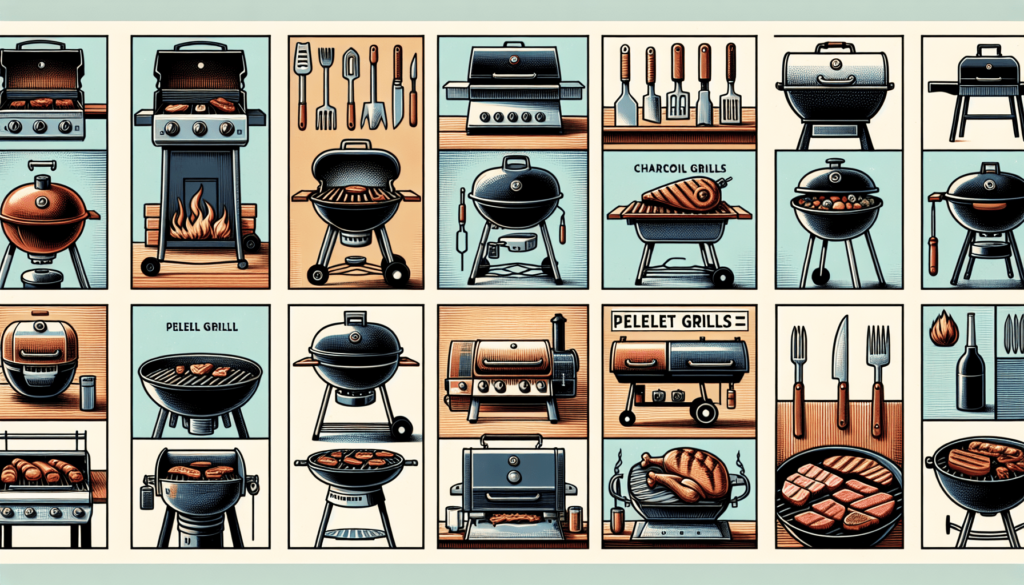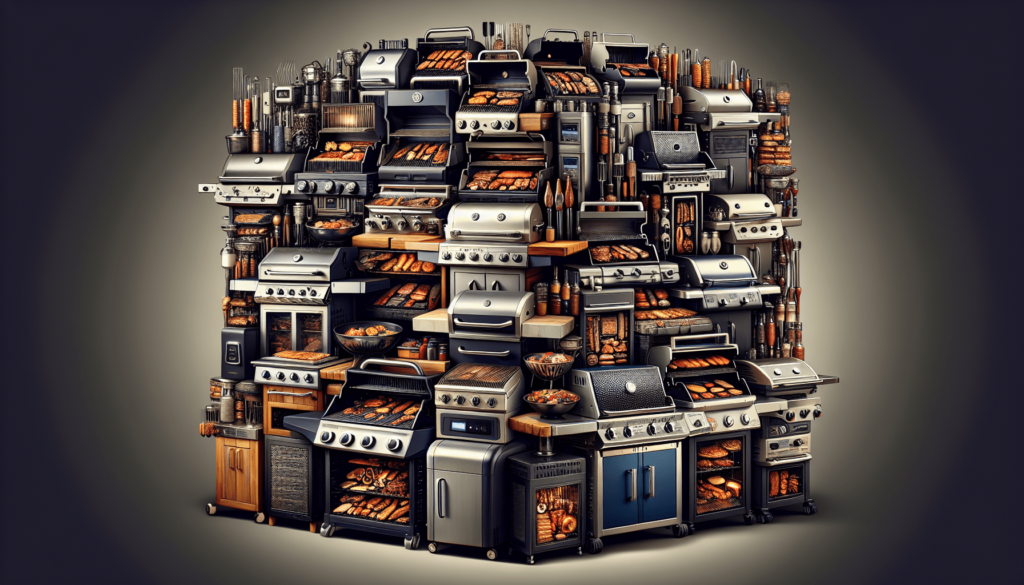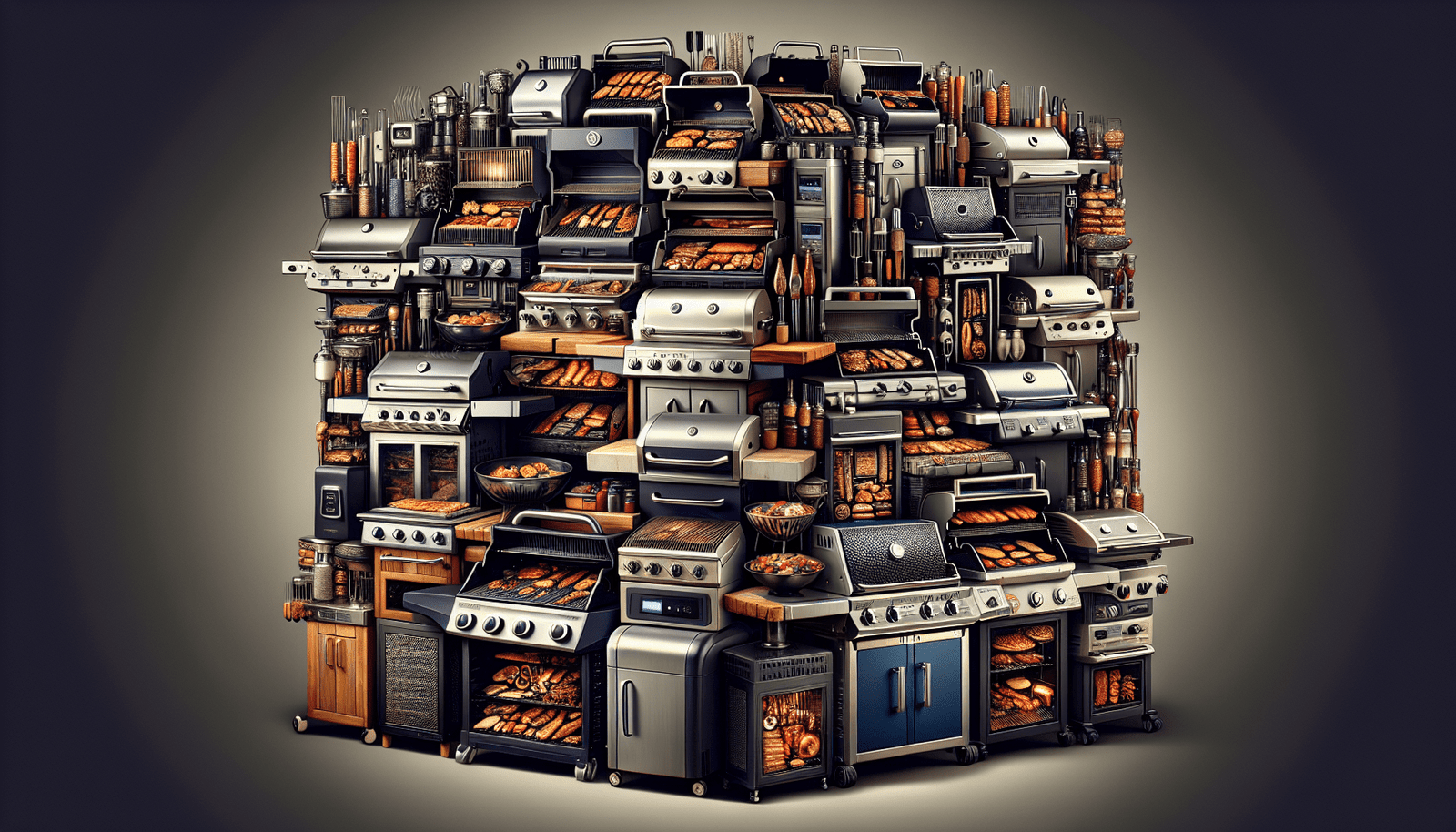Have you ever wondered about the different types of grills that are available in the market? From charcoal grills to gas grills, each has its own unique features and advantages. In this article, we will take a closer look at the various types of grills, exploring their functionalities and helping you make an informed decision about which one suits your outdoor cooking needs the best. So, whether you’re a fan of that smoky flavor or prefer quick and easy cooking, read on to discover the world of grilling possibilities.

Charcoal Grills
Overview
Charcoal grills are the classic choice for outdoor cooking enthusiasts. They rely on charcoal briquettes or lump charcoal as a heat source, which gives your food that unmistakable smoky flavor. These grills come in various sizes and styles, from basic kettle grills to more elaborate models with multiple cooking surfaces and adjustable vents.
Pros
One of the biggest advantages of charcoal grills is their ability to reach high temperatures, making them ideal for searing steaks and achieving that coveted charred crust. They also provide excellent heat distribution, ensuring even cooking throughout your food. Charcoal grills are versatile and can be used for direct and indirect heat methods, allowing you to grill, smoke, or even bake if you master the indirect cooking technique. Additionally, the natural smoky flavor of charcoal grills adds a unique taste to your dishes, enhancing the overall dining experience.
Cons
While charcoal grills offer fantastic flavor and versatility, they do require a bit of patience and skill to use effectively. Lighting the charcoal can be tricky, and it takes time for the coals to reach the desired temperature. Cleaning up after cooking can also be more involved, as you need to dispose of the ashes properly. Moreover, charcoal grills tend to generate more smoke and can be less convenient for those who prefer a quick and hassle-free cooking experience.
Gas Grills
Overview
Gas grills have gained popularity for their convenience and ease of use. These grills rely on propane or natural gas as a fuel source and come in various sizes and styles, ranging from compact tabletop models to large freestanding ones with multiple burners and additional features such as side burners and storage cabinets.
Pros
One of the key advantages of gas grills is their quick and effortless ignition. With just a touch of a button, you can have your grill up and running in no time. Gas grills offer precise temperature control, allowing you to easily adjust the heat according to your cooking needs. They also heat up quickly and maintain high temperatures consistently, making them perfect for those who desire a fast and efficient grilling experience. Additionally, gas grills are relatively low-maintenance, as there is no need to deal with charcoal or ashes.
Cons
While gas grills are convenient, they may not provide the same smoky flavor as charcoal grills. While some gas grills come with special features like smoker boxes or ceramic briquettes to enhance the flavor, it may not be as pronounced as with charcoal grilling. Gas grills also tend to be more expensive upfront and require a gas source or propane tank, which can be an additional cost. Moreover, some gas grills may lack the ability to reach extremely high temperatures for certain cooking techniques.
Electric Grills
Overview
Electric grills are a convenient choice for those who have limited outdoor space or live in apartments or condominiums where open flame grilling is restricted. These grills utilize electricity as their power source, eliminating the need for charcoal or gas.
Pros
One of the significant advantages of electric grills is their ease of use. Simply plug them into an electrical outlet, and you’re ready to start grilling. They heat up quickly and provide consistent heat, making them suitable for grilling a wide range of dishes. Electric grills also tend to be compact and lightweight, making them portable and easy to store. They are also considered more eco-friendly, as they produce fewer emissions compared to charcoal or gas grills.
Cons
While electric grills offer convenience, they may not provide the same authentic grilling experience as charcoal or gas grills. They may lack the intense heat and smoky flavor that many outdoor cooking enthusiasts seek. Additionally, electric grills may have limitations in terms of temperature control and may not achieve the high heat levels needed for certain grilling techniques. They also require access to an electrical outlet, which may limit their usability in certain outdoor settings.

Pellet Grills
Overview
Pellet grills, also known as pellet smokers, combine the convenience of gas grills with the flavors of traditional wood-fired cooking. These grills use wood pellets as their fuel source, which come in various flavors such as hickory, mesquite, and applewood.
Pros
The main advantage of pellet grills is their ability to infuse food with rich, smoky flavors. The wood pellets used as fuel impart a distinct taste, enhancing the overall quality of your grilled dishes. Pellet grills offer precise temperature control, allowing you to easily set and maintain the desired cooking temperature. They also have the versatility to grill, smoke, bake, roast, and even braise, giving you a wide range of culinary options. Additionally, pellet grills are known for their even heat distribution and can maintain consistent low and slow temperatures for long cooking sessions.
Cons
Pellet grills can be more expensive than other types of grills, and the cost of wood pellets can add up over time. They require access to electricity to power the pellet hopper and the control panel. This reliance on electricity can limit their usage in remote outdoor settings. Additionally, pellet grills may have a learning curve when it comes to the proper operation and maintenance of the grill, as they involve more complex mechanisms compared to other types of grills.
Smoker Grills
Overview
Smoker grills are specifically designed for low and slow cooking, making them perfect for barbecue enthusiasts. These grills utilize charcoal, wood logs, or wood pellets as their fuel source and rely on indirect heat and smoke to cook the food slowly, resulting in tender, flavorful dishes.
Pros
The main advantage of smoker grills is their ability to create perfectly tender and flavorful meats through slow cooking. The low and slow process allows the meat to break down gradually, resulting in a melt-in-your-mouth texture and a deep smoky taste. Smoker grills excel at cooking large cuts of meat, such as brisket and ribs, to perfection. They also provide consistent heat distribution and allow for excellent smoke absorption, resulting in consistently delicious barbecue.
Cons
Smoker grills require time and patience, as the slow cooking process can take several hours or even overnight. They also require skill and knowledge to control the temperature and maintain the smoke levels properly. The large size of smoker grills may not be suitable for those with limited outdoor space. Additionally, the cleanup process can be more involved, as ash removal and grease management may require extra attention.
Portable Grills
Overview
Portable grills are designed for those who enjoy grilling on the go. These compact and lightweight grills are perfect for camping trips, picnics, tailgating, or any other outdoor adventure.
Pros
The main advantage of portable grills is their convenience and portability. They are typically designed to be lightweight and compact, making them easy to transport and store. Despite their smaller size, portable grills can still deliver impressive cooking performance, allowing you to enjoy your favorite grilled dishes wherever you are. They often come with features like foldable legs, carrying handles, and propane adapters for added convenience.
Cons
Due to their compact size, portable grills may have limited cooking space, limiting the amount of food you can cook at once. They may also have less power or heat output compared to larger grills, which can affect cooking times. Additionally, some portable grills may not have the same durability and longevity as their larger counterparts, as they are designed for more occasional use.
Hibachi Grills
Overview
Hibachi grills, originating from Japan, are characterized by their small size and simplicity. These traditional grills consist of a portable metal or ceramic container with an open charcoal chamber.
Pros
Hibachi grills are known for their excellent heat retention, allowing for high-temperature cooking. The compact nature of these grills makes them ideal for small outdoor spaces, balconies, or tabletops. They are perfect for cooking small cuts of meat, vegetables, and even skewers. Hibachi grills also offer the opportunity for interactive cooking, as diners can gather around the grill and engage in the grilling process together.
Cons
Due to their small size, hibachi grills may not be suitable for cooking larger quantities of food at once. The lack of a lid may limit some cooking techniques, such as smoking or slow-roasting. Additionally, the open charcoal chamber may result in more direct flare-ups and higher smoke production compared to other types of grills.
Kamado Grills
Overview
Kamado grills trace their origins back to ancient China and are characterized by their egg-shaped design and ceramic construction. These grills are beloved for their versatility and superior heat retention.
Pros
Kamado grills offer exceptional heat retention and can reach high temperatures, making them suitable for various cooking methods, including grilling, smoking, baking, and even pizza-making. The ceramic material used in the construction of kamado grills allows for efficient heat distribution, resulting in evenly cooked food. They are known for their fuel efficiency, as they require less charcoal compared to other types of grills. The airtight seal of the kamado grill makes it excellent for low and slow cooking, resulting in succulent and flavorful dishes.
Cons
Kamado grills tend to be more expensive than other types of grills due to their ceramic construction and specialized features. Their weight can make them challenging to transport, limiting their portability. The learning curve for operating a kamado grill may be steeper, especially for beginners, as they require attention to temperature control and proper airflow adjustment.
Infrared Grills
Overview
Infrared grills utilize infrared technology to create intense, radiant heat that cooks food quickly and efficiently. These grills often have a sealed burner design and a ceramic or stainless steel cooking surface.
Pros
One of the significant advantages of infrared grills is their ability to reach extremely high temperatures quickly. Infrared technology allows for precise heat control, resulting in even cooking and perfect sear marks on your food. They are highly efficient, as the intense heat minimizes heat loss and reduces cooking times. Infrared grills also generate less smoke, making them ideal for those who prefer a cleaner grilling experience.
Cons
Infrared grills can be more expensive than other types of grills, primarily due to the technology involved. The intense heat may require a bit of adjustment if you’re used to traditional grilling methods. While they excel at cooking meat quickly and providing great sear marks, they may not be as suitable for slow cooking or smoking. Additionally, the high heat intensity may pose a higher risk of flare-ups, requiring attentiveness during the cooking process to avoid burning your food.
Hybrid Grills
Overview
Hybrid grills combine the best features of multiple grill types, offering a versatile cooking experience. These grills often feature interchangeable grates or burners, allowing you to switch between gas, charcoal, or even infrared cooking methods.
Pros
The biggest advantage of hybrid grills is their versatility. With the ability to switch between different cooking methods, you can enjoy the benefits of gas grilling convenience, the smoky flavors of charcoal grilling, or the intense heat of infrared grilling all in one grill. Hybrid grills provide flexibility and cater to various cooking preferences. They often come with additional features such as side burners, rotisserie attachments, and even smoker boxes, expanding your culinary possibilities.
Cons
Hybrid grills tend to be more expensive due to their multifunctionality and additional features. The complexity of these grills may require more maintenance and cleaning compared to single-function grills. The learning curve for using different cooking methods within the same grill can be steep, as each method may require different temperature control and grill setup. Additionally, the size and weight of hybrid grills may make them less suitable for those with limited outdoor space or who prioritize portability.
In conclusion, the world of grilling offers a wide array of options to cater to every outdoor cooking enthusiast’s needs and preferences. Whether you prefer the authentic smoky flavors of charcoal grills, the convenience of gas grills, or the versatility of hybrid grills, there is a grill out there for you. Consider factors such as flavor, ease of use, fuel type, cooking space, and additional features when selecting the perfect grill for your outdoor culinary adventures. Happy grilling!
